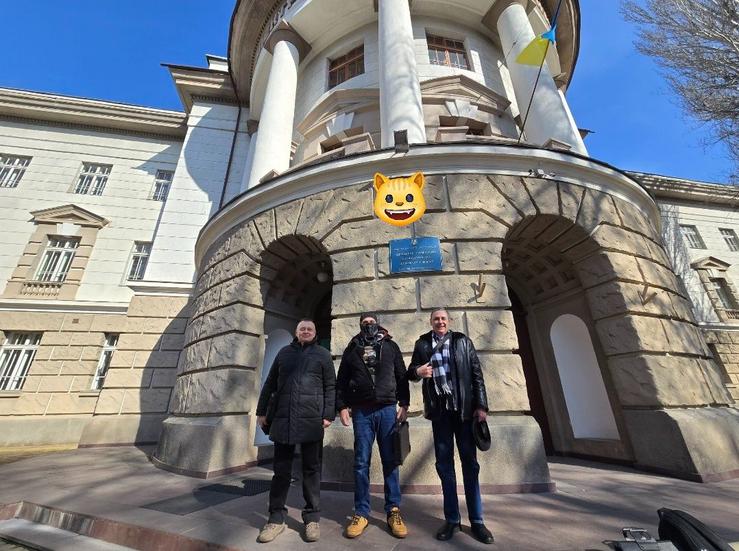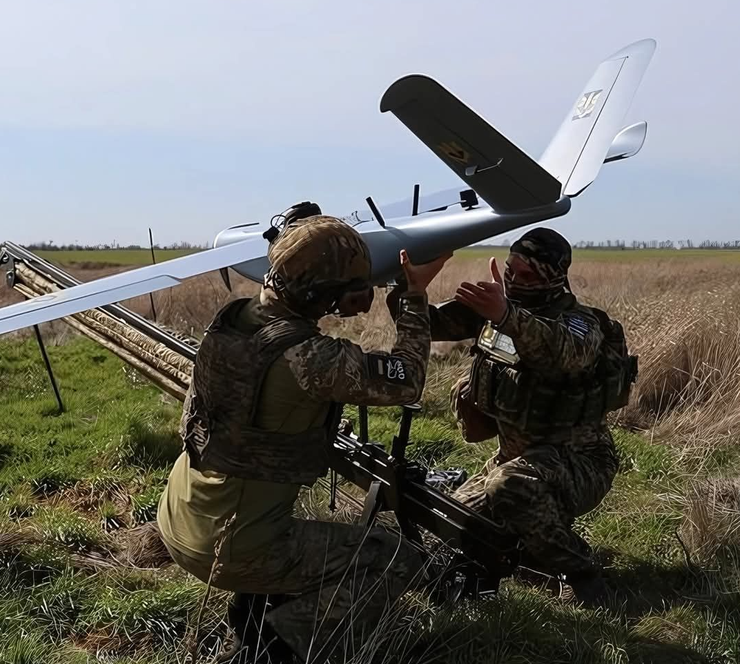The Scoop
Drone warfare has become central to Ukraine’s defense against Russia, where cheap, nimble aircraft are being deployed to counter superior firepower. What began as modified hobbyist drones have evolved into a large industry which experts say could position Ukraine as a leading supplier of low-cost weapons for the drone age.
Riding that wave is Khaled Alfaiomi, a Syrian-born cybersecurity expert and entrepreneur, operating under a pseudonym for safety reasons. He leads a Kyiv-based maker of long-range surveillance aircraft and short-range loitering munitions: Ukraine has agreed to buy up the company’s full output during the war and for up to two years after the conflict ends, Alfaiomi told Semafor in an interview.
Even as the war rages, Alfaiomi is focused on expansion. He said the company is building a €1 billion ($1.1 billion) factory in an undisclosed European country, citing security concerns.
Know More
Unmanned aircraft are viewed in military and government circles with a mixture of awe and FOMO. At the Qatar Economic Forum last week, former CIA Director and retired US General David Petraeus called Ukraine’s drone warfare progress “breathtaking.” A week prior, US President Donald Trump lamented the disparity in cost between Iranian-made kamikaze aircraft — about $40,000 — and what a US contractor recently proposed: $41 million.
The Iranian drones are “very good, and fast and deadly,” Trump said. “You hide behind a tree and it circles you with fire. You don’t have a chance, and the tree comes down also.”
Alfaiomi is building capacity to fill the demand for weapons that are both lethal and affordable. His company’s main product is a fixed-wing surveillance aircraft with a 260-kilometer (160-mile) range and 4-hour flight time, capable of identifying and tracking targets, and guiding strikes. A kit of three drones and control systems sells to NATO customers for €350,000 — and to Ukraine for €250,000 — with the cameras alone costing €100,000. He said the total price was half the cost of comparable systems from other countries.
The company also sells suicide, fixed-winged drones — in packs of 10 — for $20,000 to $65,000, depending on specifications. It developed a model with a 1,500-km range and around a 100-kg payload, which is an indication of how quickly the capabilities are advancing.
Step Back

Alfaiomi didn’t plan to be in Ukraine. He said he left Syria after high school, studied in Germany and the US, and worked in the UAE and Ukraine. In 2013, as the Euromaidan protests erupted, he joined demonstrators calling for the ouster of Moscow’s ally Viktor Yanukovych. “I sat with them in the snow and cold. I’m a revolutionary — I’m used to it from Syria,” he said.
Many of the protesters he met there ended up in government. He said he was granted Ukrainian citizenship a few months after Yanukovych was deposed. A cybersecurity firm he ran landed contracts with embassies and government agencies. He also invested in EV charging infrastructure, benefiting from Ukraine’s decision to waive import taxes on electric vehicles.
The war prompted a pivot. Ukraine’s government provided strong incentives to spur domestic production of defense equipment: guaranteed margins, purchase commitments, streamlined customs approvals, and military exemptions for factory workers. Alfaiomi said his company now employs 550 people and produces four reconnaissance aircraft a day — and many more of the suicide drones — with over 700 units in service.
He is cautious about publicity. He declined to be photographed during our meeting in Abu Dhabi and was vague about his time in the US, worried it could reveal his real identity. In Ukraine, he wears a mask, wary of Russian targeting. (An industry event was hit by an airstrike in 2023). He declined to name the company he leads, but provided video proof of the production facility and documents related to the drone’s specs.
Mohammed’s view
The drone revolution is making warfare cheaper, faster, and more precise, flattening the battlefield.
There’s no shortage of footage online showing soldiers attempting, in vain, to escape suicide drones. They are legitimate targets — there’s no moral argument against killing combatants during war — but the capabilities raise concerns that human restraint in conflict is eroding: Our impulse for mercy, exhaustion, or compromise are what often bring wars to a halt.
In a future shaped by AI-driven autonomous weapons, conflicts can become perpetual. The advantage will lie for a period with those who master the technology, but as it proliferates, it could increase instability.
Ukraine is currently ahead, thanks to wartime urgency, and US and European support. But this edge will likely be short-lived. Most of the tech isn’t proprietary. Others will catch up.
Room for Disagreement
As Semafor columnist Omar Al-Ubaydli argues, proliferation of the technology may create mutual deterrence, and hence more stability. He writes that the best defense against swarms of unmanned systems is a credible offensive deterrent. Air defenses alone won’t stop precision attacks: “Deterrence by capability is the rational option,” he writes.
Notable
- First-person view drones are driving a military revolution, argues US Army Officer Antonio Salinas in a War on the Rocks essay. “It feels as if there are a thousand snipers in the sky.”
- Ukraine’s use of drones has had a multiplier effect on its combat power, and is changing the nature of warfare, The New York Times’ C.J. Chivers reports from the frontlines.


